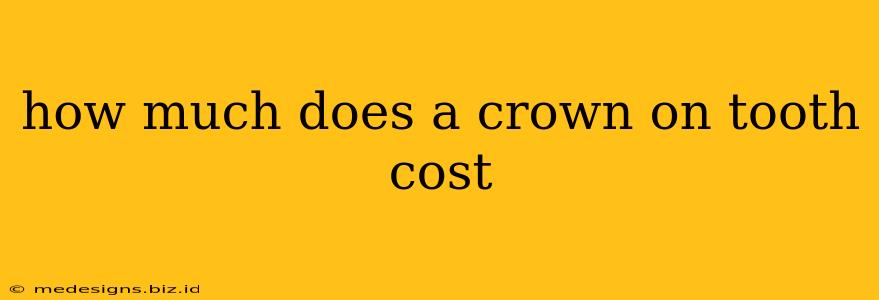Getting a dental crown can significantly improve your oral health and the appearance of your smile. But before you schedule that appointment, understanding the cost is crucial. This guide breaks down the factors influencing the price of a tooth crown and helps you navigate the financial aspects of this common dental procedure.
Factors Affecting the Cost of a Tooth Crown
The price of a dental crown varies widely depending on several key factors:
1. Type of Crown Material:
This is perhaps the biggest determinant of cost. Different materials offer varying levels of durability, aesthetics, and, of course, price.
- Porcelain Fused to Metal (PFM): A popular and relatively affordable choice. The metal substructure provides strength, while the porcelain facing offers a natural-looking appearance.
- All-Porcelain or All-Ceramic Crowns: These offer superior aesthetics, closely matching the natural color of your teeth. However, they tend to be more expensive than PFM crowns. Materials like zirconia and e.max are common choices in this category.
- Gold Crowns: Known for their exceptional durability and longevity, gold crowns are highly resistant to wear and tear. However, they are less aesthetically pleasing than porcelain options.
- Base Metal Alloys: These are the least expensive option, but they are not as strong or aesthetically pleasing as other materials. They are typically only used in less visible areas of the mouth.
2. Location of the Tooth:
Crowns on more visible teeth (front teeth) often require higher aesthetic standards, leading to a higher cost. Materials like all-porcelain are often preferred for front teeth, increasing the overall expense.
3. Complexity of the Procedure:
Simple crown placement is less expensive than more complex procedures. Factors such as extensive tooth preparation, root canal treatment needed before the crown, or potential gum surgery can significantly increase the cost.
4. Dentist's Fees and Location:
Dentists' fees vary based on their experience, location (urban areas tend to have higher costs), and practice overhead. It's always a good idea to obtain quotes from multiple dentists in your area.
5. Insurance Coverage:
Dental insurance plans vary widely in their coverage for crowns. Some plans may cover a portion of the cost, while others may offer minimal or no coverage. Check your policy carefully to understand your benefits.
Average Cost Range:
While providing exact figures is impossible due to the variability discussed above, you can expect a general cost range:
- Lower End: A simple crown with a less expensive material might cost around $800 - $1500 per tooth.
- Mid-Range: A more aesthetically pleasing crown (e.g., all-porcelain) or one involving moderate complexity could range from $1500 to $3000 per tooth.
- Higher End: Complex cases involving multiple procedures or high-end materials may cost significantly more, potentially exceeding $3000 per tooth.
Tips for Managing the Costs:
- Shop Around: Get quotes from multiple dentists to compare prices and services.
- Understand Your Insurance Coverage: Know your benefits and limitations before proceeding.
- Consider Payment Plans: Many dentists offer financing options to make treatment more manageable.
- Explore Alternative Treatments: In some cases, less expensive options like fillings may be feasible. Discuss all possibilities with your dentist.
In conclusion, the cost of a tooth crown is a significant investment in your oral health. By understanding the factors that influence the price and exploring your options, you can make an informed decision that suits both your needs and your budget. Remember to consult with your dentist to discuss the best treatment plan for your specific situation.
